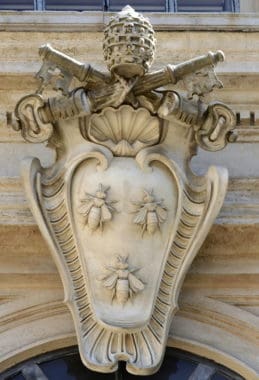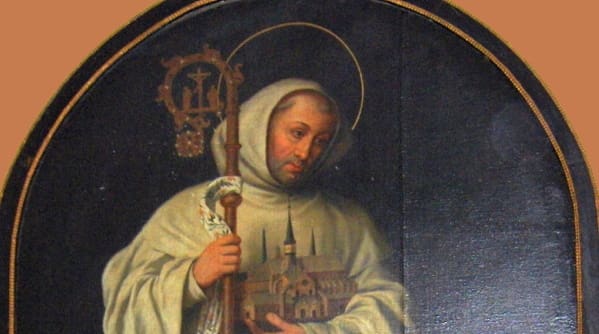On the Words to Ahaz:
“Ask Thee a Sign”
(Part II of II)
Advent Homily of St. Bernard of Clairvaux
 Editor’s Note: In part I, we looked at Isaiah’s prophecy of the sign given by God Himself: a virgin who will give birth to Emmanuel. We also examined that, as opposed to Adam, Emmanuel would choose good and reject evil. Today, we will look at St. Bernard’s interpretation of the spiritual imagery of this prophecy.
Editor’s Note: In part I, we looked at Isaiah’s prophecy of the sign given by God Himself: a virgin who will give birth to Emmanuel. We also examined that, as opposed to Adam, Emmanuel would choose good and reject evil. Today, we will look at St. Bernard’s interpretation of the spiritual imagery of this prophecy.
From milk we obtain two substances, butter and cheese. Butter is oily and moist; cheese, on the contrary, is hard. Our little one knew well how to choose when, eating the butter, He did not taste the cheese. Behold, therefore, how He chose the best; He assumed our nature free from all corruption of sin. Of sinners we read that their heart is curdled as milk; the purity of their nature is corrupted by the fermentation of malice and iniquity.
And now let us turn to the honey. Our bee feeds among lilies, and dwells in the flowery country of the angels. This bee flew to the city of Nazareth, which is, interpreted, a flower; He came to the sweet- smelling flower of perpetual virginity; He settled upon it, He clove to it. But bees, besides their sweet honey, have likewise their sharp sting. The Prophet that sang of the mercy and judgment of the Lord, knew that this bee had a sting as well as honey (cf Psalm 118:12). Nevertheless, when He descended to us He brought honey only that is, mercy, not judgment so that to the disciples who wished to call down fire from heaven on the cities that would not receive Him, He answered: “The Son of Man is not come to judge the world, but to save it” (cf John 12:47). Our bee had no sting in His mortal life; amid the extremity of insult He showed mercy, not judgment. Christ, then, may be symbolized both as a bee and as the flower springing from the rod. And, as we know, the rod is the Virgin Mother of God.
smelling flower of perpetual virginity; He settled upon it, He clove to it. But bees, besides their sweet honey, have likewise their sharp sting. The Prophet that sang of the mercy and judgment of the Lord, knew that this bee had a sting as well as honey (cf Psalm 118:12). Nevertheless, when He descended to us He brought honey only that is, mercy, not judgment so that to the disciples who wished to call down fire from heaven on the cities that would not receive Him, He answered: “The Son of Man is not come to judge the world, but to save it” (cf John 12:47). Our bee had no sting in His mortal life; amid the extremity of insult He showed mercy, not judgment. Christ, then, may be symbolized both as a bee and as the flower springing from the rod. And, as we know, the rod is the Virgin Mother of God.
This flower, the Son of the Virgin, is “white and ruddy, chosen out of thousands” (Song of Songs 5:10). It is the flower on which the angels desire to look, the flower whose perfume shall revive the dead, the flower, as He Himself declares, of the field, not of the garden. This flower grew and flourished in the field independent of all human culture; unsown by the hand of man, untilled by the spade, or fattened by moisture. So did the womb of Mary blossom. As a rich pasture it brought forth the flower of eternal beauty, whose freshness shall never fade nor see corruption, whose glory is to everlasting. O sublime virgin rod, that raisest thy holy head aloft, even to Him Who sitteth on the throne, even to the Lord of Majesty! And this is not wonderful, for thou hast planted thy roots deeply in the soil of humility. O truly celestial plant, than which none more precious, none more holy! O true tree of life, alone deemed worthy to bear the fruit of salvation! Thou art caught, O wicked serpent, caught in thy own cunning; thy falsity is laid bare. Two evils thou hadst imputed to thy Creator; thou hadst defamed Him by envy and by lying, but in both imputations thou art convicted a liar. He to whom thou hadst promised that he should not die did die, “and the truth of the Lord remaineth forever” (cf Psalm 117:2). And now answer, if thou canst, what tree God could forbid man, seeing He denied him not this chosen rod, this sublime fruit? For “he that spared not his own Son, how hath he not with him given us all things?” (cf Romans 8:32).
It is now surely clear how the Virgin is the royal way by which the Saviour has drawn near to us, coming forth from her womb as a Bridegroom from His bridal chamber. Holding on, therefore, to this way, let us endeavour to ascend to Him by her, through Whom He descended to us; let us seek His grace through her by whom He came to succour our need.
O blessed finder of grace! Mother of life! Mother of salvation! May we through thee have access to thy Son, that through thee we may be received by Him Who through thee was given to us. May thy integrity and purity excuse before Him the stain of our corruption; may thy humility, so pleasing to God, obtain from Him the pardon of our vanity. May thy abundant charity cover the multitude of our iniquity, and thy glorious fruitfulness supply our indigence of merits. Our Lady, our Mediatrix, our Advocate, reconcile us to thy Son, commend us to thy Son, present us to thy Son. By the grace thou hast found, by the prerogative thou didst merit, by the mercy thou didst bring forth, obtain, O blessed one, that He Who vouchsafed to become partaker of our infirmity and misery, may, through thy intercession, make us partakers of His blessedness and glory, Jesus Christ, thy Son, our Lord, Who is God blessed above all for evermore. Amen.
*
Art: Bernard of Clairvaux, as shown in the church of Heiligenkreuz Abbey [German language site] near Baden bei Wien, Lower Austria. Portrait (1700) with the true effigy of the Saint by Georg Andreas Wasshuber (1650-1732), (painted after a statue in Clairvaux with the true effigy of the saint), Georges Jansoone, 1 June 2006, own work, PD-US copyright expired; Symbol of Vatican – Barberini, photographer Livioandronico2013, 7 September 2014, CCA-SA; both Wikimedia Commons.





